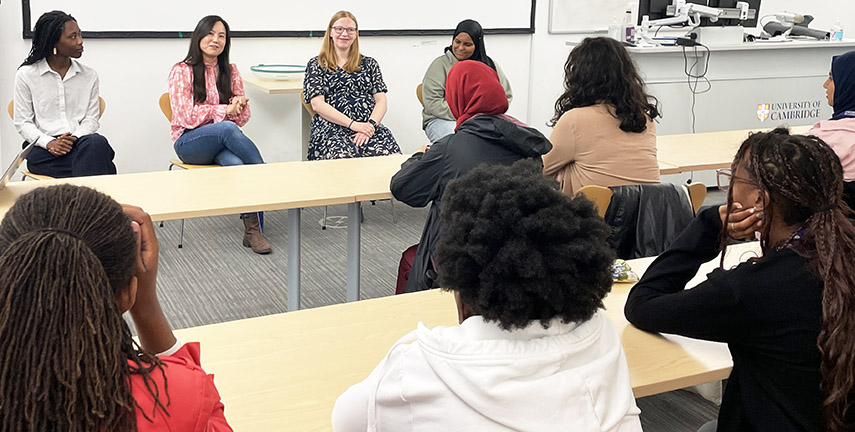
Submitted by Rachel Gardner on Tue, 22/07/2025 - 12:36
A group of Year 12 students from across the UK visited Cambridge for a residential course at the end of our five-month Women in Computer Science programme. Congratulations to them on their hard work and achievements.
In a packed two-day programme, the students presented the research they'd worked on during the programme, explored the Department, took part in a programming workshop and toured several Cambridge colleges. They also heard from four female Computer Science alumni who have gone on to work in academia and industry. (See main photo, above.)
Additionally, the Year 12 students – who came from Belfast, Birmingham, London and Southampton among other areas – attended a talk on applying to Cambridge and chatted to some of our current Computer Science undergraduates about their experiences of studying here. Then, to celebrate the ending of the programme, they attended a formal dinner at Robinson College and stayed the night there.
Background
 A five-month programme, Women in Computer Science gives female and non-binary students in Year 12 (i.e. the first year of A Levels) an insight into what studying Computer Science at university is like. The aim is to encourage more of them to apply to study Computer Science at university the following autumn.
A five-month programme, Women in Computer Science gives female and non-binary students in Year 12 (i.e. the first year of A Levels) an insight into what studying Computer Science at university is like. The aim is to encourage more of them to apply to study Computer Science at university the following autumn.
Through a series of online seminars, participants are introduced to different areas of Computer Science from machine learning to networking. They then do a research project in an area that interests them, mentored by a current University of Cambridge undergraduate. All students who submit a completed project are invited to the end-of-programme residential.
Projects
The projects spanned a wide range of areas from using AI in genomic health prediction to the increasing role played in conflicts by cyberwarfare.
Overall, the standard of work was extremely impressive. Several projects were highly commended and we presented Judith, Esther and Sofia with Best Project Awards for their work on 'Understanding how computers interpret and improve in reading human writing', 'How close are LLMs to becoming indistinguishable from humans, and how does that impact us?' and 'If a self-learning AI commits harm, is the blame on its creator, the company that distributes its services, or the AI itself?'.
Inspiration
Students told us a number of factors had got them interested in Computer Science. Eva, from London, has been interested in Computer Science since she started Secondary school "because it’s a practical subject. I found I really enjoyed coding and I liked the fact that I could build something and control the way I did so."
Another participant, Fabeha from Belfast, is visually impaired. So "I'm interested in the potential of Computer Science to help other people with visual impairments," she says. She's also very interested in biology and how we can harness AI to help us make vital advances in medicine. In her project, she explored "how machine learning can help us fight antimicrobial resistance more effectively and prevent millions of deaths in future. It's opening up new possibilities in this area by detecting resistant bacteria in as little as 30 minutes and helping scientists discover new antibiotics like Halicin," she explains.
This residential has helped me decide on applying to Cambridge because it's shown me what it would be like to be a Cambridge student."
Encouragement to study Computer Science
The programme has clearly encouraged students seriously to pursue their interest in Computer Science. Anne-Marie, from Birmingham, enjoyed the webinars run during the programme. "I thought it was a cool way of learning about areas of Computer Science I didn’t know much about or that weren't covered by our course. I was interested in the webinars on how Computer Science is being used in Biology and Physics." She says that she is "definitely going to study Computer Science at university, though I'm not sure yet where I'll be applying."
 Sofia, who came to the UK from Ukraine and is now living near Southampton, says "for a long time I thought I wanted to study Engineering, but this programme has shown me that I actually want to study something more theoretical. The Computer Science course at Cambridge is quite theoretical, so it really appeals to me." She adds, "The residential has helped me decide between applying to Cambridge and to another university because it’s shown me what it would be like to be a Cambridge student."
Sofia, who came to the UK from Ukraine and is now living near Southampton, says "for a long time I thought I wanted to study Engineering, but this programme has shown me that I actually want to study something more theoretical. The Computer Science course at Cambridge is quite theoretical, so it really appeals to me." She adds, "The residential has helped me decide between applying to Cambridge and to another university because it’s shown me what it would be like to be a Cambridge student."
Demilade, from London, will also be applying to Cambridge to study Computer Science. "The programme has been very insightful. I was torn between studying Maths and Computer Science and now I've decided on Computer Science. I also liked the college we stayed in. Before I came here, I was thinking of making an open application, but I liked the modern college we stayed in – Robinson – so I've decided I'm going to apply there."

